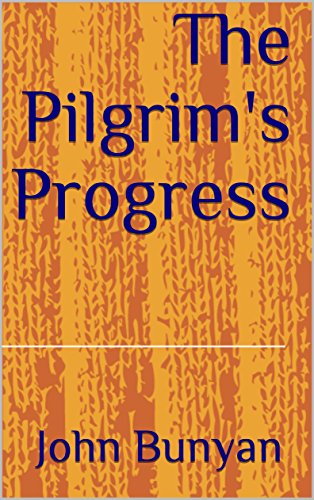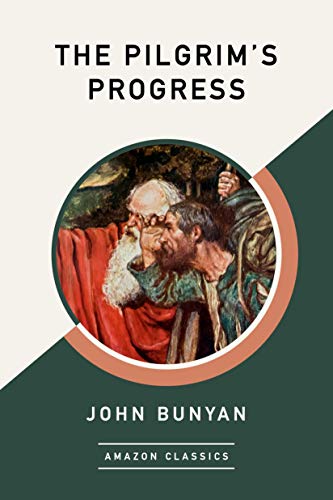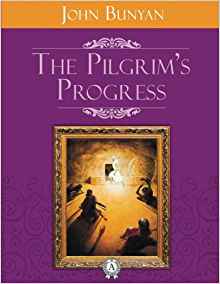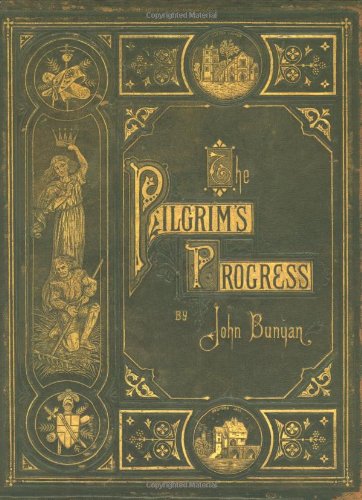-
The Pilgrim's Progress
John Bunyan
eBook (Positive Action for Christ, June 12, 2018)John Bunyan (28 November 1628 – 31 August 1688) was an English Christian writer and preacher, famous for writing The Pilgrim's Progress. In the Church of England, he is remembered with a Lesser Festival on 30 August. Bunyan was born in Harrowden (one mile southeast of Bedford), in the Parish of Elstow, England. He was baptized John Bunyan, on November 30, 1628 as recorded in the Elstow parish register. The family has a long history in England and the name has been found spelled over thirty-four different ways: Binyan, Buniun, Bonyon, Buignon, being the most common - Bunyan being the most recent. John Bunyan was born to Thomas Bunyan and Margaret Bently; she was also from Elstow and she, like her husband, was born in 1603. They married on May 27, 1627 and in 1628 Margaret's sister, Rose Bently, married Thomas' half-brother Edward Bunyan. (Thomas had married his first wife in 1623 and like his father before him, would marry two more times within months of being widowed.) They were working-class people with Thomas earning a living as a tinker or brazier; one who mends kettles and pots. Bunyan wrote of his modest origins, "My descent was of a low and inconsiderable generation, my father's house being of that rank that is meanest and most despised of all the families of the land". He had very little schooling (about 2–4 years). He was educated at his father's house with other poor country boys and what little education he received was to benefit his father and his own future trade. He followed his father in the Tarish Tinker's trade, which at the time had a reputation as being a lowly sort of occupation and was associated historically with the nomadic lifestyle of gypsies. In 1644, at the age of sixteen, Bunyan lost his mother and two sisters, all who died within months of each other; and his father married for the third time. It may have been the arrival of his stepmother that precipitated his estrangement and subsequent enlistment in the parliamentary army. He served in the parliamentary army at Newport Pagnell garrison (1644-1647) as the civil war was nearing the end of the first stage. He was saved from death by a fellow soldier who volunteered to go into battle in his place and was killed while walking sentry duty[1]. After the civil war was won by The Parliamentarians, Bunyan returned to his former trade and eventually found a wife. In 1649 (when he was about 21), he married a young woman, Mary, whose only dowry appears to have been two books, Arthur Dent's Plain Man's Pathway to Heaven and Lewis Bayly's Practice of Piety, by which he was influenced towards a religious life. She was an orphan, her father leaving only those two books as her inheritance, and their life was modest to say the least. Bunyan writes that they were "as poor as poor might be", not even "a dish or spoon between them". In his autobiographical book, Grace Abounding, Bunyan describes himself as having led an abandoned life in his youth, and as having been morally reprehensible as a result. However, there appears to be no evidence that he was outwardly worse than the average of his neighbours. Examples of sins to which he confesses in Grace Abounding are profanity, dancing and bell-ringing. The increasing awareness of his un-Biblical life led him to contemplate acts of impiety and profanity; in particular, he was harassed by a curiosity in regard to the "unpardonable sin," and a prepossession that he had already committed it. He was known as an adept linguist as far as profanity was concerned, even the most proficient swearers were known to remark that Bunyan was "the ungodliest fellow for swearing they ever heard". While playing a game, Tip-cat, in the village square, Bunyan claimed to have heard a voice that asked: "Wilt thou leave thy sins and go to heaven or have thy sins and go to hell?" He believed it was the voice of God chastising his indulgent ways, as Puritans held sacred the Sabbath day and permitted no sport.
-
The Pilgrim's Progress
John Bunyan
Paperback (Dover Publications, Feb. 10, 2003)Often rated as important as the Bible as a Christian document, this famous story of man's progress through life in search of salvation remains one of the most entertaining allegories of faith ever written. Set against realistic backdrops of town and country, the powerful drama of the pilgrim's trials and temptations follows him in his harrowing journey to the Celestial City.Along a road filled with monsters and spiritual terrors, Christian confronts such emblematic characters as Worldly Wiseman, Giant Despair, Talkative, Ignorance, and the demons of the Valley of the Shadow of Death. But he is also joined by Hopeful and Faithful.An enormously influential 17th-century classic, universally known for its simplicity, vigor, and beauty of language, The Pilgrim's Progress remains one of the most widely read books in the English language.
-
The Pilgrim's Progress
John Bunyan, Reverend Jesse Lyman Hurlbut
language (AmazonClassics, May 7, 2019)Plagued by spiritual anguish, devout everyman Christian fears his fate in the sinful City of Destruction. He’s told that only by embarking for the Celestial City can he achieve personal salvation. After his wife and children refuse to join him, he sets forth alone into the unknown. Mocked for his faith, tempted at every turn, and heartened by fellow pilgrims, Christian’s winding journey toward grace unfolds. But as he reaches Mount Zion, his family chooses to follow the same treacherous path, hoping to join Christian in the shining light.John Bunyan began to write The Pilgrim’s Progress while in prison for nonconformist preaching. His dream-framed allegory, edited in 1909 by American clergyman Jesse Lyman Hurlbut, stands as one of the most profoundly influential novels ever written.Revised edition: Previously published as The Pilgrim's Progress, this edition of The Pilgrim's Progress (AmazonClassics Edition) includes editorial revisions.
-
The Pilgrim's Progress
John Bunyan, Steve West, Brilliance Audio
Audiobook (Brilliance Audio, May 7, 2019)Plagued by spiritual anguish, devout everyman Christian fears his fate in the sinful City of Destruction. He’s told that only by embarking for the Celestial City can he achieve personal salvation. After his wife and children refuse to join him, he sets forth alone into the unknown. Mocked for his faith, tempted at every turn, and heartened by fellow pilgrims, Christian’s winding journey toward grace unfolds. But as he reaches Mount Zion, his family chooses to follow the same treacherous path, hoping to join Christian in the shining light. John Bunyan began to write The Pilgrim’s Progress while in prison for nonconformist preaching. His dream-framed allegory, edited in 1909 by American clergyman Jesse Lyman Hurlbut, stands as one of the most profoundly influential novels ever written. Revised edition: Previously published as The Pilgrim’s Progress, this edition of The Pilgrim’s Progress (AmazonClassics Edition) includes editorial revisions.
-
The Pilgrim's Progress
John Bunyan
Paperback (CreateSpace Independent Publishing Platform, May 27, 2015)The Pilgrim's Progress from This World to That Which Is to Come; Delivered under the Similitude of a Dream is a Christian allegory written by John Bunyan (1628–1688) and published in February, 1678. It is regarded as one of the most significant works of religious English literature, has been translated into more than 200 languages, and has never been out of print. Bunyan began his work while in the Bedfordshire county prison for violations of the Conventicle Act, which prohibited the holding of religious services outside the auspices of the established Church of England. Early Bunyan scholars like John Brown believed The Pilgrim's Progress was begun in Bunyan's second, shorter imprisonment for six months in 1675,but more recent scholars like Roger Sharrock believe that it was begun during Bunyan's initial, more lengthy imprisonment from 1660–72 right after he had written his spiritual autobiography, Grace Abounding to the Chief of Sinners.
-
The Pilgrim's Progress
John Bunyan
eBook (Dover Publications, March 5, 2012)Often rated as important as the Bible as a Christian document, this famous story of man's progress through life in search of salvation remains one of the most entertaining allegories of faith ever written. Set against realistic backdrops of town and country, the powerful drama of the pilgrim's trials and temptations follows him in his harrowing journey to the Celestial City.Along a road filled with monsters and spiritual terrors, Christian confronts such emblematic characters as Worldly Wiseman, Giant Despair, Talkative, Ignorance, and the demons of the Valley of the Shadow of Death. But he is also joined by Hopeful and Faithful.An enormously influential 17th-century classic, universally known for its simplicity, vigor, and beauty of language, The Pilgrim's Progress remains one of the most widely read books in the English language.
-
The Pilgrim's Progress
John Bunyan, Andronum
Paperback (CreateSpace Independent Publishing Platform, May 22, 2018)The Pilgrim's Progress from This World to That Which Is to Come by John Bunyan is a bright example of the new Christian allegory of XVII century. The author, son of an ordinary sheet metal worker (rather despised job that had to done by the people with the lowest social status in England), John Bunyan used to be a sinner and ribald before marriage. Only after marrying an orphan Marry, whose only heritage was two books: Plain Man’s Pathway to Heaven by Arthur Dent and Practice of Piety by Lewis Bayly, he started his uneasy way to moral recovery. Considerably soon, Bunyan became a preacher. He was numerously chased by the authorities as well as English Church for his Christian views, baptistic in particular. He began writing The Pilgrim's Progress from This World to That Which Is to Come in prison. The book is questionable and contradictive but written very sincerely and persuasively. This work is probably one of the most famous allegories ever written. The book is translated into many languages. Protestants translated often the book into different languages as the second one after the Bible.
-
The Pilgrim's Progress
John Bunyan, Roger Pooley
Paperback (Penguin Classics, Jan. 27, 2009)A new edition of one of the greatest allegorical stories ever written. Nominated as one of America’s best-loved novels by PBS’s The Great American ReadA masterpiece of the English Puritan tradition, The Pilgrim's Progress is rich in its imaginative power and its vivid and heartfelt language. It recounts the story of Christian, who appears to the author in a dream, and his journey to Heaven through the trials and tribulations of life. He meets many like-minded pilgrims on his way, such as Faithful and Hopeful, but before they attain their goal they encounter the Giant Despair and the River of Death itself. Translated into more than one hundred languages, The Pilgrim's Progress continues to have an immeasurable influence on English literature.For more than seventy years, Penguin has been the leading publisher of classic literature in the English-speaking world. With more than 1,700 titles, Penguin Classics represents a global bookshelf of the best works throughout history and across genres and disciplines. Readers trust the series to provide authoritative texts enhanced by introductions and notes by distinguished scholars and contemporary authors, as well as up-to-date translations by award-winning translators.
-
The Pilgrim's Progress
John Bunyan
eBook•This e-book publication is unique which include biography and Illustrations. •A new table of contents has been included by the publisher. •This edition has been corrected for spelling and grammatical errors.
-
The Pilgrim's Progress
John Bunyan
Hardcover (Master Books, Oct. 20, 2005)Strengthen your faith with this exquisite collection of classic Christian literature by the gifted and highly acclaimed John Bunyan. While imprisoned in the 17th century for not conforming with the Church of England, Bunyan, a lay preacher, penned the timeless Pilgrim's Progress known today as one of the most inspiring allegories of the Christian faith ever written and the second most read book in the world. Many recipients of this keepsake endeavor to read it through each year. This Christian classic, steeped in simple, vigorous and beautiful prose, transports readers of all ages into a powerful drama revealing the difficult and yet sanctifying trials faced by every Christian pilgrim. Charles Spurgeon, the Prince of Preachers, so highly treasured this metaphorical wonder he read it over 100 times. Pilgrim's Progress has been mandatory reading for many generations of Christian students and families. Its message, a strong bastion of truth and courage, is a timeless gift to the Church. Boasting 860 pages, Bunyan's compilation has been meticulously reproduced from a 125 year old manuscript, keeping its vintage double-column format, large print, and font. A rare keepsake worthy of any library, this edition of Pilgrim's Progress includes these five classics by John Bunyan. THE HOLY WAR (Page 377 - 684) A discourse of trial made by Shaddai upon Diabolus, for the Regaining the Metropolis of the World; or, the losing and taking again of the Town of Man-soul. GRACE ABOUNDING TO THE CHIEF OF SINNERS (Page 685 - 688) A detailed and faithful account of the Life of John Bunyan including his imprisonment, recovery and conversion to becoming a faithful follower of Jesus Christ. THE IMPRISONMENT AND RELEASE OF JOHN BUNYAN (Page 689 - 703) --includes dialgoue with Dr. Lindale and the Justices; examination by the Justices, and by Mr. Cobb, the clerk of the peace; interview with his wife and Judge Hale. BUNYAN'S DYING SAYINGS (Page 704 - 767) --Of sin; of affliction; repentance and coming to Christ; of prayer; Lord's day and daily duties; love of the world; of suffering; death and judgment; the joys of heaven and torments of hell. CHRISTIAN BEHAVIOUR; (Page 768 - 800) thoughts concerning true Christianity and how to walk so as to please God. Also included are footnotes, commentary, and Scripture references missing in the small paperback editions of Pilgrims Progress. Bunyan's Pilgrim's Progress with featured writings is the size of a family Bible. It is dressed in a golden-embossed hard cover with gold-tipped, parchment-like paper and satin ribbon bookmark. Fine art quality, full color as well as black and white illustrations are found throughout. Enjoy this ageless and inspiring treasure as an addition to your own personal library or delight someone of remarkable taste with this splendid, soul-strengthening gift.
-
The Pilgrim's Progress: By John Bunyan - Illustrated
John Bunyan, Rose
Paperback (CreateSpace Independent Publishing Platform, May 9, 2016)Why buy our paperbacks? Standard Font size of 10 for all books High Quality Paper Fulfilled by Amazon Expedited shipping 30 Days Money Back Guarantee BEWARE of Low-quality sellers Don't buy cheap paperbacks just to save a few dollars. Most of them use low-quality papers & binding. Their pages fall off easily. Some of them even use very small font size of 6 or less to increase their profit margin. It makes their books completely unreadable. How is this book unique? Unabridged (100% Original content) Font adjustments & biography included Illustrated About The Pilgrim's Progress by John Bunyan The Pilgrim's Progress from This World to That Which Is to Come; Delivered under the Similitude of a Dream is a Christian allegory written by John Bunyan (1628–1688) and published in February, 1678. It is regarded as one of the most significant works of religious English literature, has been translated into more than 200 languages, and has never been out of print. Bunyan began his work while in the Bedfordshire county prison for violations of the Conventicle Act, which prohibited the holding of religious services outside the auspices of the established Church of England. Early Bunyan scholars like John Brown believed The Pilgrim's Progress was begun in Bunyan's second, shorter imprisonment for six months in 1675, but more recent scholars like Roger Sharrock believe that it was begun during Bunyan's initial, more lengthy imprisonment from 1660–72 right after he had written his spiritual autobiography, Grace Abounding to the Chief of Sinners.
-
The Pilgrim's Progress: By John Bunyan : Illustrated
John Bunyan
eBook (Digireads.com, Oct. 29, 2017)About The Pilgrim's Progress by John BunyanHow is this book unique?E-reader & tablet formatted, Font Adjustments100% Original contentUnabridged EditionAuthor Biography InsideIllustrations includedThe Pilgrim's Progress from This World to That Which Is to Come; Delivered under the Similitude of a Dream is a Christian allegory written by John Bunyan (1628–1688) and published in February, 1678. It is regarded as one of the most significant works of religious English literature, has been translated into more than 200 languages, and has never been out of print. Bunyan began his work while in the Bedfordshire county prison for violations of the Conventicle Act, which prohibited the holding of religious services outside the auspices of the established Church of England. Early Bunyan scholars like John Brown believed The Pilgrim's Progress was begun in Bunyan's second, shorter imprisonment for six months in 1675, but more recent scholars like Roger Sharrock believe that it was begun during Bunyan's initial, more lengthy imprisonment from 1660–72 right after he had written his spiritual autobiography, Grace Abounding to the Chief of Sinners.